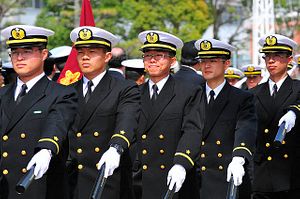While Prime Minister Shinzo Abe has shown himself to be one of the most hawkish leaders of postwar Japan, sources within his government indicate that he plans on taking a very pragmatic approach to further implementing his policies, particularly on collective self-defense. Those sources stress that Abe intends to show that the economy is his primary concern, upon which all his other polices rest. However, other reports suggest that the government is proceeding with unchecked momentum, now that the Cabinet has officially changed its interpretation of collective self-defense, toward both increasing Japan’s military budget and strengthening its alliance with the U.S.
Sources within the ruling Liberal Democratic Party who spoke with Reuters indicate that Abe is well aware of the impact his government’s change to collective self-defense has had on his popularity, which dipped below 50 percent shortly after his Cabinet approved the change and has only recently recovered. His aides are reportedly attempting to redirect public attention toward Abe’s economic policies, which had proven to be largely successful until the impact of the recent consumption tax increase drastically reduced second quarter growth. According to a senior member of the coalition government, “Mr Abe himself understands well what he must do as prime minister – and that is not simply to forge ahead with his own agenda.”
However, the defense ministry is reportedly requesting another major increase in its budget, over and above the last fiscal year’s increase, which was one of the few portfolios to not see a reduction amid government-wide belt tightening. The request is for a record 5.05 trillion yen ($48.5 billion), which the ministry claims will mainly be directed toward the defense of remote islands and a new marine fighting force. The budget is 3.5 percent greater than the previous year’s, the majority of which will be spent on materiel and training directed at asserting Japan’s claims to disputed islands, particularly those with China such as the Senkaku/Diaoyus.
In addition to the defense budget, the government is also set to enhance the Self-Defense Forces capabilities when it revises the Japan-U.S. Defense Cooperation Guidelines. In a government report expected next month, the Yomiuri Shimbun reported that the SDF’s abilities will be expanded “to include the provision of arms and ammunition as well as airborne refueling to the U.S. military’s fighter jets in the event of contingencies surrounding Japan but before Japan exercises its right to self-defense.” These contingencies specifically refer to conflict on the Korean Peninsula, which would allow the SDF to support the U.S. in a way previously not allowed by the Constitution, but which the government believes are in line with its new interpretation of collective self-defense.
Finally, the government is also considering boosting its space-based security operations. The Basic Plan on Space Policy is being considered for revision this year, in order to be in line with government policy on the use of space. The plan calls for increasing the number of satellites in order to monitor China’s maritime activity, in order to “establish a space surveillance system by using satellites in the fields of the management of Self-Defense Forces units, data gathering and ocean surveillance.” The proposal would increase the number of quasi-zenith satellites from one to four, and eventually seven, in order to provide constant real-time surveillance of all regions. The plan would also increase the function of the security operation, allowing greater image resolution, an early warning system to detect missile launches, and greater cooperation with the U.S. in sharing information.
While Abe and his Cabinet may be publicly avoiding mention of its new stance on collective self-defense, it appears to have everything set in motion to solidify that stance. In particular concerning its relationship with the U.S., the government is eager to codify their bilateral security obligations. There are several reasons to take this approach: First, spelling out Japan’s obligations to provide ammunition and refuel U.S. jets could somewhat offset the expected U.S. reduction in military spending to regional security. Second, it would enshrine in the Defense Cooperation Guidelines their mutual obligations, so that U.S. assistance in disputes over remote islands is more explicitly spelled out rather than implied. Third, it could make the changes to Japan’s security stance more palatable to the public, as a display of Japan’s meeting its security obligations to its strongest ally. Whether this is indeed the government’s rationale is unclear, but as it goes forward taking these policies through the Diet this fall, the administration will have to be careful not to exacerbate the impression that collective self-defense has not been adequately vetted in the public sphere.

































